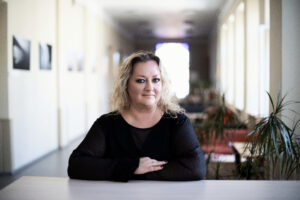According to her, intermediality allows us to better communicate ideas, attract the attention of audiences and convey complex messages in innovative ways. KTU professor believes that intermediality is particularly relevant today because of the development of digital technologies in communication, where social networks, multimedia platforms, virtual reality and artificial intelligence solutions are becoming increasingly important. They are not only changing communication practices, but are also having a major impact on culture, education and the social environment.
“Understanding these phenomena helps to develop critical thinking and to create dialogue and cooperation in different contexts,” says Juzelėnienė.
Topics covered are particularly relevant in the contemporary context
Prof. Petronienė is convinced that the humanities need to open up to other fields if they are to remain relevant. Therefore, the field of the conference’s themes is expanded each time to a wider range of researchers – this year, the speakers were joined by music researchers from Lithuania and other countries. In addition, the number of presentations on topical themes, such as the use of artificial intelligence in communication and education, has increased.
“Professor Saulius Keturakis of KTU SHMMF will invite the audience to reflect on the topic of artificial intelligence and artificial stupidity, asking how far artificial intelligence is able to be creative, original and innovative,” Petronienė announces one of the presentations, adding that it is difficult to single out one presentation from the large group of competent speakers.
The main themes to be analysed at the conference are the interaction between language, communication, translation, technology, discourse, music, interculturality and cultural studies, i.e. the interactions between the humanities, the social sciences, technology and even the arts.
“The themes discussed at the conference are particularly relevant in today’s context of rapid technological development, globalisation and intense cultural interaction. These topics are relevant both for researchers analysing communication processes and for practitioners wishing to apply the latest insights in their work,” says Prof. Juzelėnienė.
According to her, we live in a global society with intercultural communication challenges, where digital communication, which is being altered by social media, artificial intelligence and interactive platforms, affects not only academic research but also its practical application. These aspects make it crucial to understand and gain insight into the processes involved, thus developing critical thinking and societal resilience in times of change.
The conference “Intermediality in Communication: translation, media, discourse” will take place on 21-22 November at KTU SHMMF (A. Mickevičiaus g. 37), Room 202 (auditorium). The conference programme can be downloaded here. The conference page is here.




